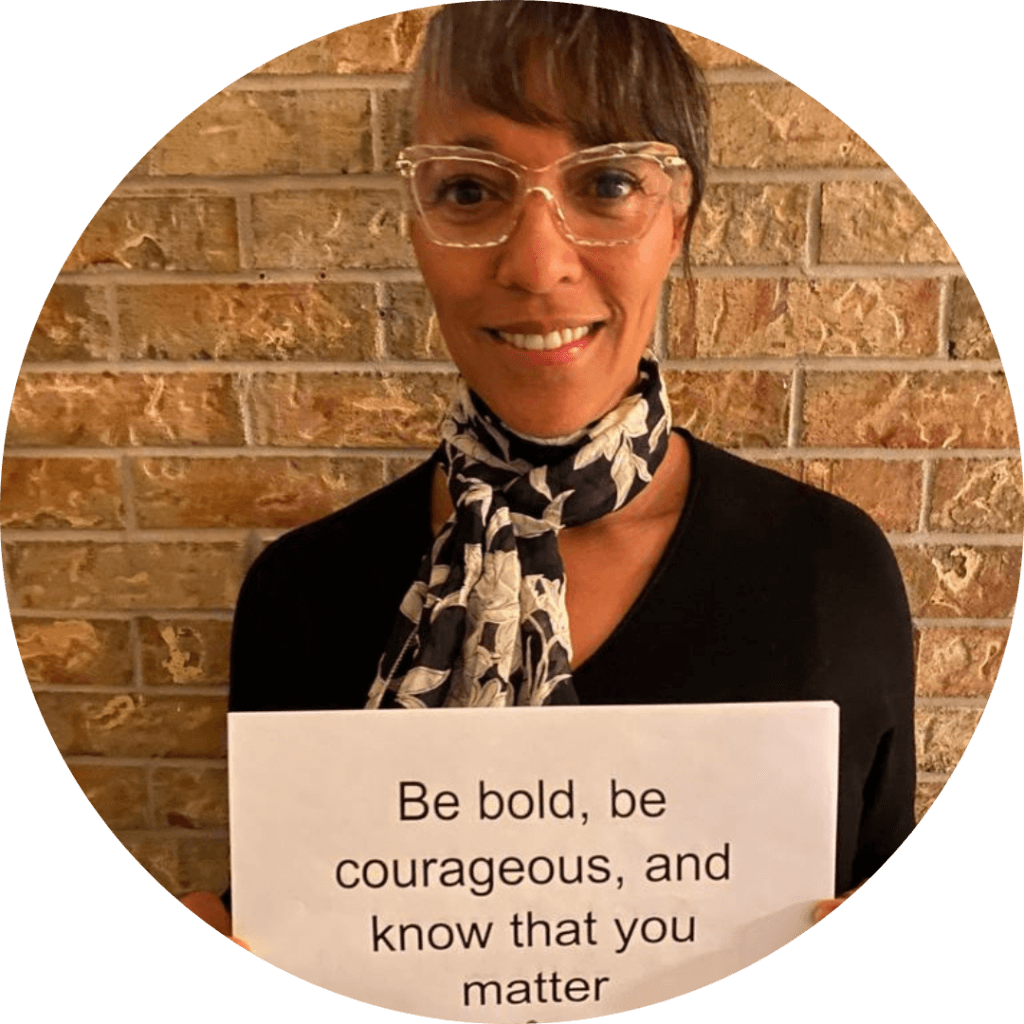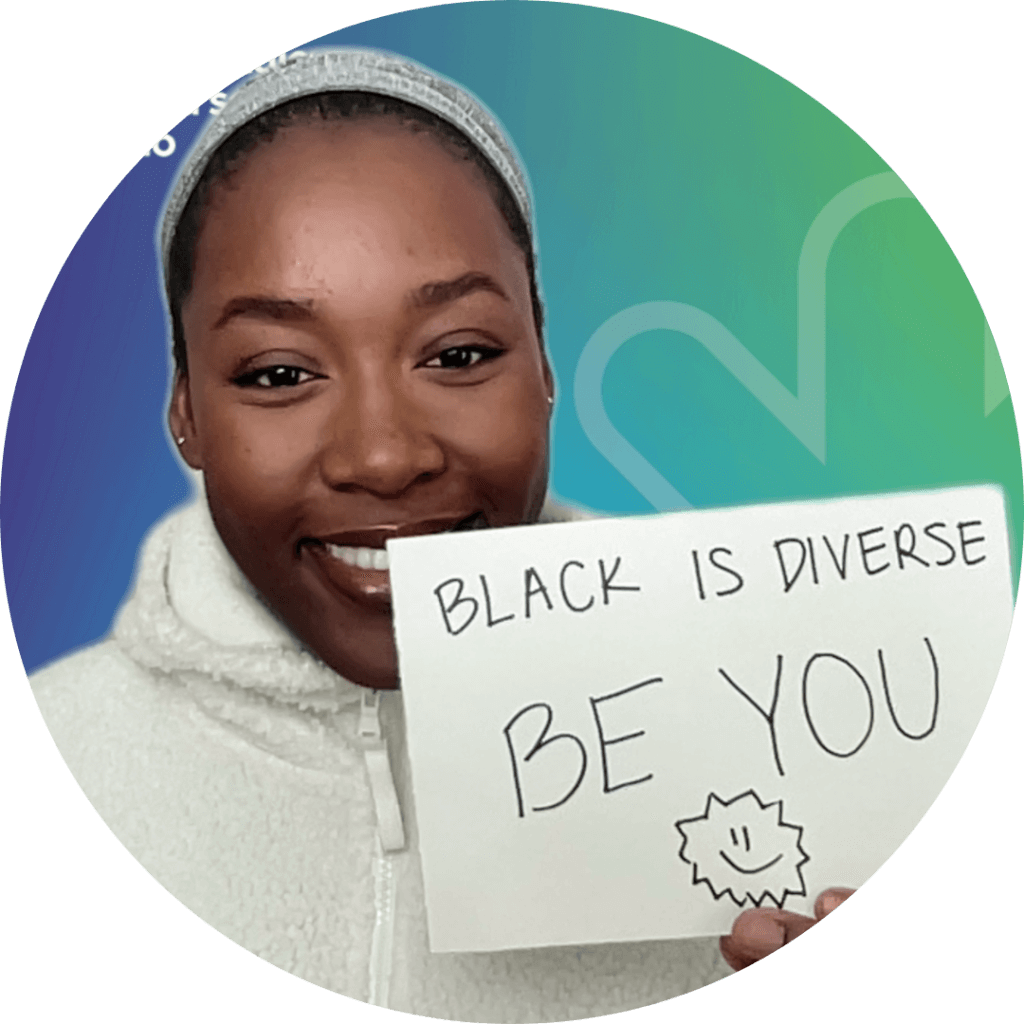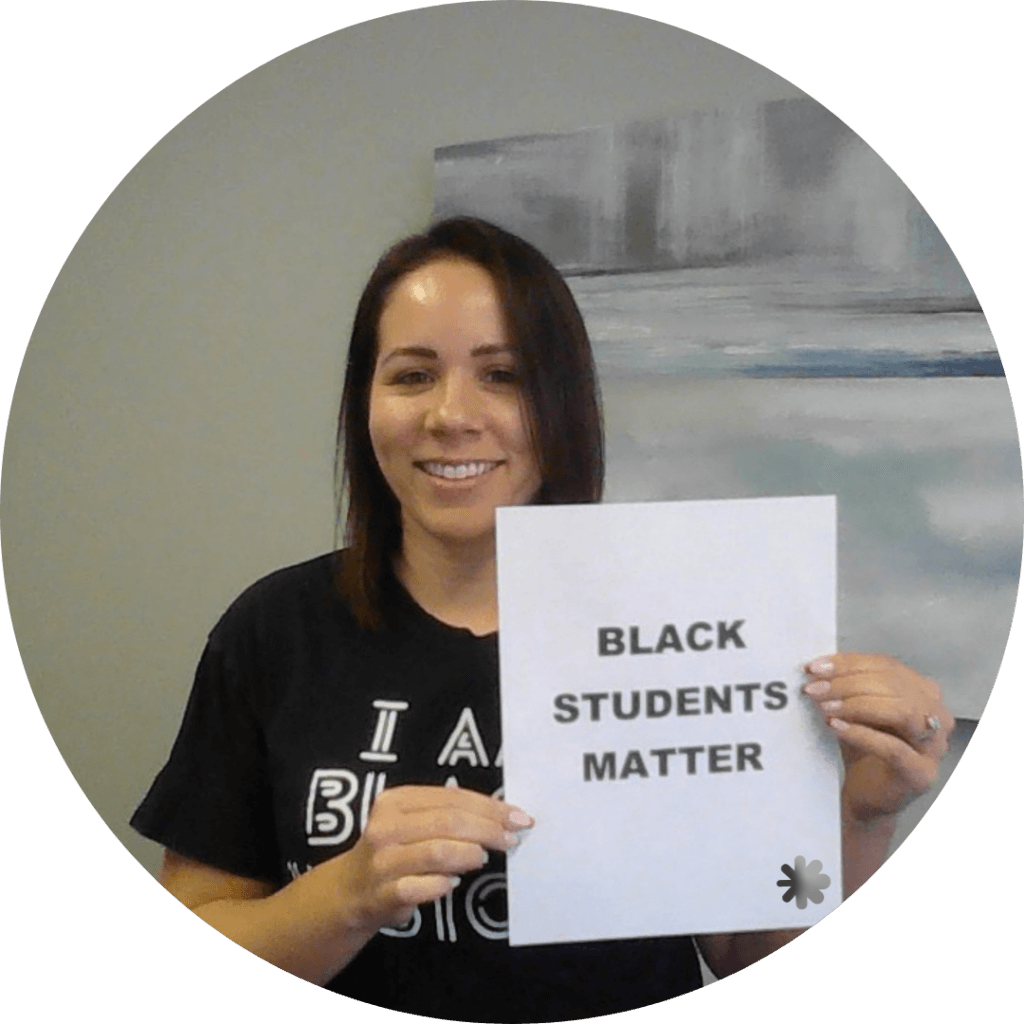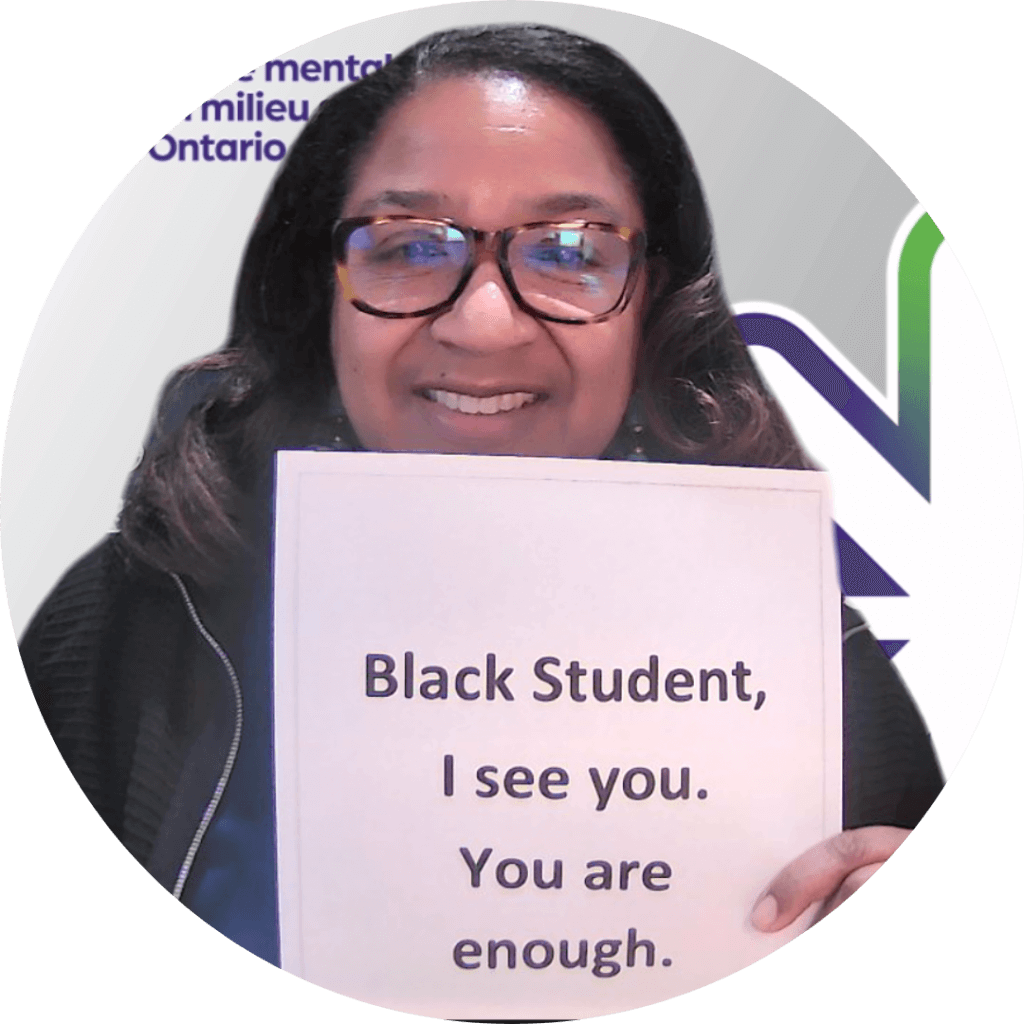A love letter to Black students: part 4
It was an honour and absolute privilege to share space with four colleagues that exude Black excellence. Patricia Codner, Tracey Grose, Toni Lauzon, and Joyce Erogun agreed to share some of their lived experiences and words of wisdom with us. This conversation reflected diverse experiences. It showed that Blackness is not a monolith, and that unity is found through acknowledging our similarities and our differences. All of which should be celebrated.
This blog post is the fourth and final in a series of four posts developed from the conversation.
Meet our colleagues

Patricia Codner
My name is Patricia Codner, and I’m currently at School Mental Health Ontario as the parent and caregiver engagement and literacy consultant on secondment* from the Halton Catholic District School Board as the chief social worker. I am a Black woman, a daughter. I’m a mother, a wife, an auntie, a friend, and a colleague.

Joyce Erogun
My name is Joyce Erogun. I’m a consultant at School Mental Health Ontario, in the role of student and parent/caregiver engagement team lead. My pronouns are she/her. I’m a Nigerian first-generation Canadian woman. I’m an older sister, a friend, and a partner.

Toni Lauzon
Toni Lauzon. Pronouns are she/her. Self-identify as Afro-Indigenous, or Black and Mi’kmaw to be specific. I am an equity and identity-affirming mental health consultant and implementation coach here at School Mental Health Ontario on secondment* from Greater Essex District School Board.

Tracey Grose
My name is Tracey Grose, and I’m a school social worker for over 20 years in Whitby, Ontario. I am a cisgender female, with pronouns she/her. I’m of Jamaican ancestry and I’m the culturally responsive practices lead and an implementation co-coach here at School Mental Health Ontario, on secondment* from the Durham District School Board.
*Secondment means that the person is temporarily working for School Mental Health Ontario while still being considered an employee of their school board. It’s similar to an exchange program in school.
Why is it important that schools acknowledge anti-Black racism, the enslavement of Africans, Black joy, and Black excellence?
Patricia: In the Black community, we know the value of being together, and that is also threatening in the old days or colonial times. You separate folks and separate their children – that is what keeps them enslaved even more. And so, I think it’s so important that schools acknowledge anti-Black racism, the enslavement of Africans, Black joy and Black excellence. And, as we said, the time that we have now is critical to talk about it, because unless we shift the narrative for people to understand what we’ve come through and the impacts of it, they will not be able to understand and see us in our glory.
It’s important for schools to acknowledge and teach about the history of Black people across the globe, which was a direct result of colonialism, making that connection, it’s white people, right? It’s not about necessarily Black people. It’s enslavement by white people which painted a psychological and a social mindset that Black people are not equal to white people. That’s the essence of what it did, and that’s so ingrained even today.
Shade-ism is now an issue. The closer you get to white it gives you status, and that is present in Jamaica, and many of the Caribbean countries. Colonialism robbed our sense of self, our pride, our natural ways of being, and our ability to thrive in every aspect of our lives.
It’s not that we are not capable, but the systems do not allow us to be, to navigate freely, and to act and speak and behave in our natural ways. That creates distress, it creates self-harm. It creates a mindset that makes us behave in ways that are not really our true authentic selves.
We look at our young Black men right now, and I can speak for Toronto. They are so crippled by the history of the legacy of slavery and society locks them into the paradigm of not being human. It creates a very, very difficult discourse to thrive and flourish. And so, schools being a place of learning or teaching, it’s so important that they go deep into the history to gain insight and understand how history impacts the way Black boys are showing up today.
We know that systems were built on systemic racism. It was built intentionally, to the point that people can’t even see it anymore, because it’s in the brick and mortar.
Acknowledging that we’re not granted the same opportunities as white people in general to learn and have access to all that society affords white persons to thrive – we must name these things. That’s what sets up the different outcomes for students in the system. It’s not designed for our students. Systemic racism permeates the fabric of our society so much that it’s hard to see racism until it’s exposed by those who shine the light on it.
We have children right now – Black parents… Okay, I’m getting emotional… But parents/caregivers of Black children are the ones who are shining light in the system, namely education on things that have happened to Black children for centuries. But now because we have advocacy, it’s come to light, and we can name it. Therefore, it’s important to teach Black history to all students. Not just white students –everyone should learn about it and address racism throughout the school year.
It helps students, parents, and caregivers to learn the truth about slavery. The impact on the lives of Black people to eradicate Black racism. This will be beneficial to all students and make schools a place where Black students will feel belonged, valued, and appreciated.
Furthermore, it will remove the low expectations that society has of Black students. Black history teaches about the positive contributions and accomplishments that Black people have made in our country’s growth and development. In addition, hopefully, this type of learning will inspire levels of understanding and compassion toward other racialized people.
Toni: When I think about schools, acknowledging Black enslavement and anti-Black racism, I think it’s imperative because our country’s narrative is that we’re the land of freedom for enslaved people from the US. That we offered a way via the underground railroad to this country as a beacon of hope for the enslaved people of the US. And our narrative of this country ignores the truth, and without highlighting it with every opportunity that we get, then it will easily be ignored. You know, we need to shine a light on it – on a country that doesn’t want to take ownership or pay reparations for the harms done. So, I think that’s why it’s important for schools to acknowledge Canada’s history of enslaving Black peoples for over 200 years. And obviously, this history of enslavement, racial segregation, marginalization, and Black exclusion has left a legacy of anti-Black racism, these things are interconnected, and we have to talk about them together. We can’t talk about enslavement and not talk about anti-Black racism. We know that racism is the child of slavery. Right? Like they started slavery and then racism was created to justify slavery. It is imperative that they are talked about together because if we don’t understand the truth and we don’t move forward with solutions that actually acknowledge, name, and understand that that was the reality and that is the reality, then the solutions are not going to be impactful. Like you can’t put a band-aid over something that requires you to blow the thing up and start over sometimes.
… [the] narrative of this country ignores the truth, and without highlighting it with every opportunity that we get, then it will easily be ignored.
So, I just think there has to be an understanding.
When I think about Black excellence and Black joy, one of the things that is challenging for me is that it’s often talked about within the context of enslavement and anti-Black racism. To me sometimes, there’s this like message, “Black people are excellent and brilliant, because of their ability to be resilient despite this history” And it’s like, no, no, no. We are excellent and brilliant, that’s it.
I think there’s merit in Black excellence, obviously, and Black joy to be celebrated at all times, and that it doesn’t always need to be associated with the history of Black enslavement and the realities of anti-Black racism.
Tracey. That’s a very good point. I believe that we should be acknowledging anti-Black racism in education because I know, whenever I’m part of a function of space, and we open with [acknowledgements of Black enslavement, Black joy, and Black excellence], I think like okay, like I feel my shoulders go down. I feel like this welcoming, like, okay, they get it. They see me. I’m here. And acknowledging that history validates the history of segregation of schools in Ontario.
I can remember when I first heard that they were segregated schools, in our great country of Canada! What? Canadians are supposed to be the most, you know, friendly. You put that tag on your suitcase when you travel because everybody loves Canadians. But oh, you have a dark history.
Acknowledging that truth is important, because then it just sets the stage by the beginning of what is reality. Similar to what’s been said so far by Patricia and Toni, it’s like the terms on which we’re going to begin this process. We’re not going to begin with lies.
And then celebrating Black joy and excellence. Yeah, it does kind of go with the idea of resilience. In spite of. But that’s not where our history started. So… at least we’re saying something that has been silent and not voiced for most of my educational history in Canada, right? We’re supposed to be celebrating multiculturalism and sort of kumbaya. Yeah, and that didn’t really tell the whole story. So, acknowledging these truths is about starting from reality – starting from truth.
Joyce: I feel like everyone has said everything that could be said here because when I read this question, my first thoughts were like, “are we just going to pretend that everything’s just fine and dandy like, how could school not acknowledge anti-Black racism, the enslavement of Africans, Black joy, and Black excellence?” And also, if we don’t acknowledge these things, then who and what experiences are centred in our schools?
In Ontario, we often talk about mentally healthy schools, and to me, that means that young people can enter school and feel supported and that their identities and their whole selves are affirmed and acknowledged. And so, the same would go with Black students and their existence, their histories, and the fact that joy and excellence exist in this amazing community. All of those things have kind of already been shared.
And Toni’s points just about separating those concepts is an interesting one because even when I was reflecting, I did find myself saying, “and despite this, we also”, it kept going back to that. and it’s like, no! We can talk about Black joy and excellence every single day of the year, and it doesn’t have to be because of what we’ve been through or the slavery. It can just be, and that’s valid as well.
So anyway, lots of food for thought, thanks for everyone, for sharing
Patricia: I really appreciate some new thoughts or thinking that Toni, Tracey, and Joyce just shared, and I just want to piggyback on that, because it flows into the next thing around what can schools do to commemorate…
My thinking is that when I – and I often speak about despite because really, actually, when I say “despite”, it’s the fact that we are able to rise up through that horrible discourse that was created to keep us down so it actually amplifies our power, our strength, our inner being because really it could have crushed us to the point of nonexistence, so I see it from that perspective.
I see it from… when you think about just how atrocious slavery was, it’s like in the Indigenous world where they wanted to “beat the Indian out of the Indigenous children”. And yet, despite that, they rose up. It’s the same for me when I think about slavery.
But this is the impact. This is how it has changed the trajectory of their lives and so I want educators to recognize their role and that if they are not, they can cause harm. My people caused harm. What I’m doing caused harm.” They don’t even go there. They still strictly go, “well, if [students] would only behave, if they will only study, or if they only, only, only…” So, I do appreciate the new thoughts you’ve given me, and I will reflect more on it.
Thank you Patricia, Tracey, Toni, and Joyce for your sharing. Every word expressed a sense of vulnerability and care. We appreciate your work, time and love.
To Black students across Ontario, we hope that after reading these posts you feel seen and validated. Continue to shine, the world needs your brilliance. Your mental health matters.
To all students across the province, we hope that these posts have filled your bucket and offered you additional pieces of information along your learning journey.
Thank you for reading.
This conversation was facilitated by Elo Igor and Alina Medeiros
